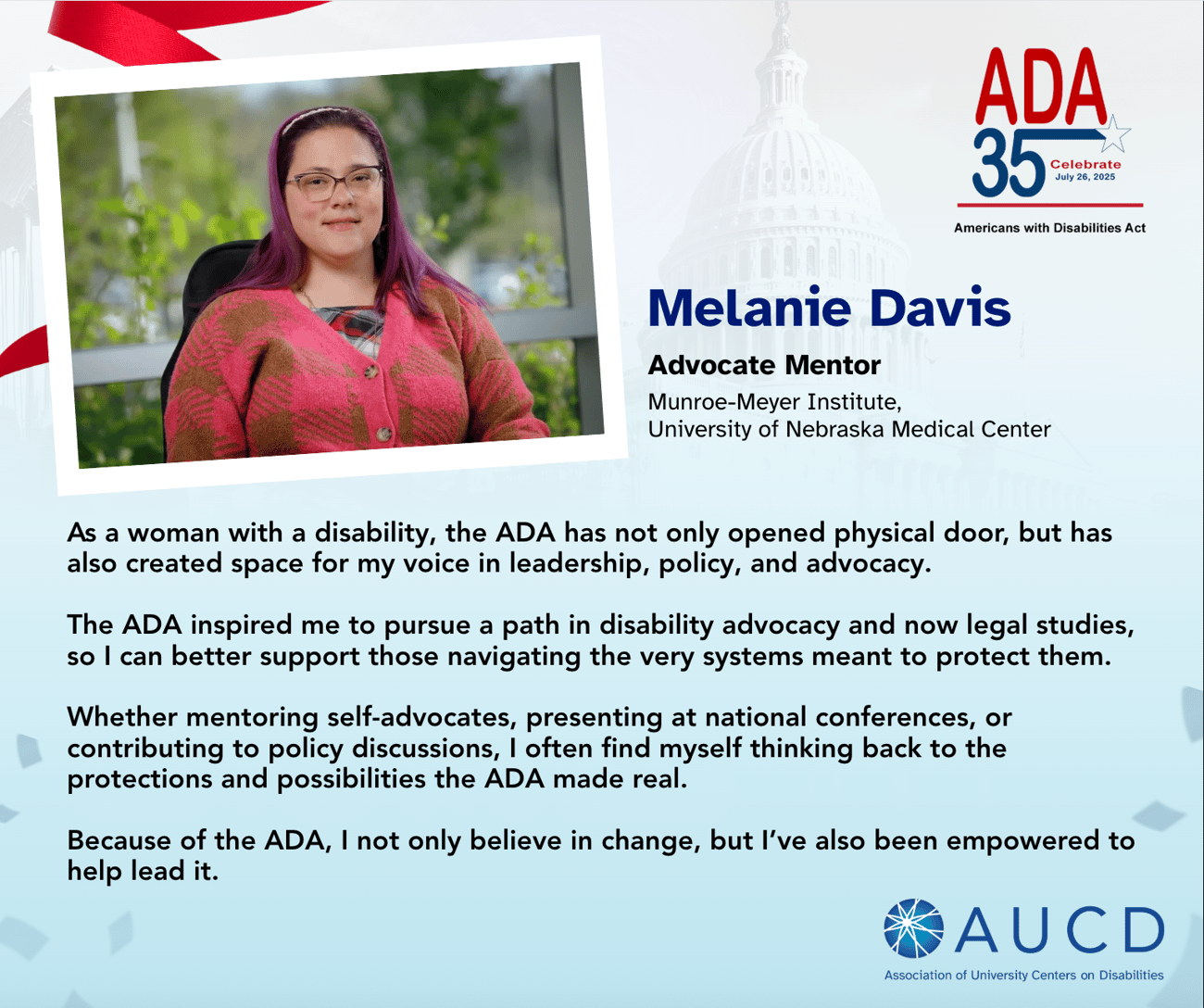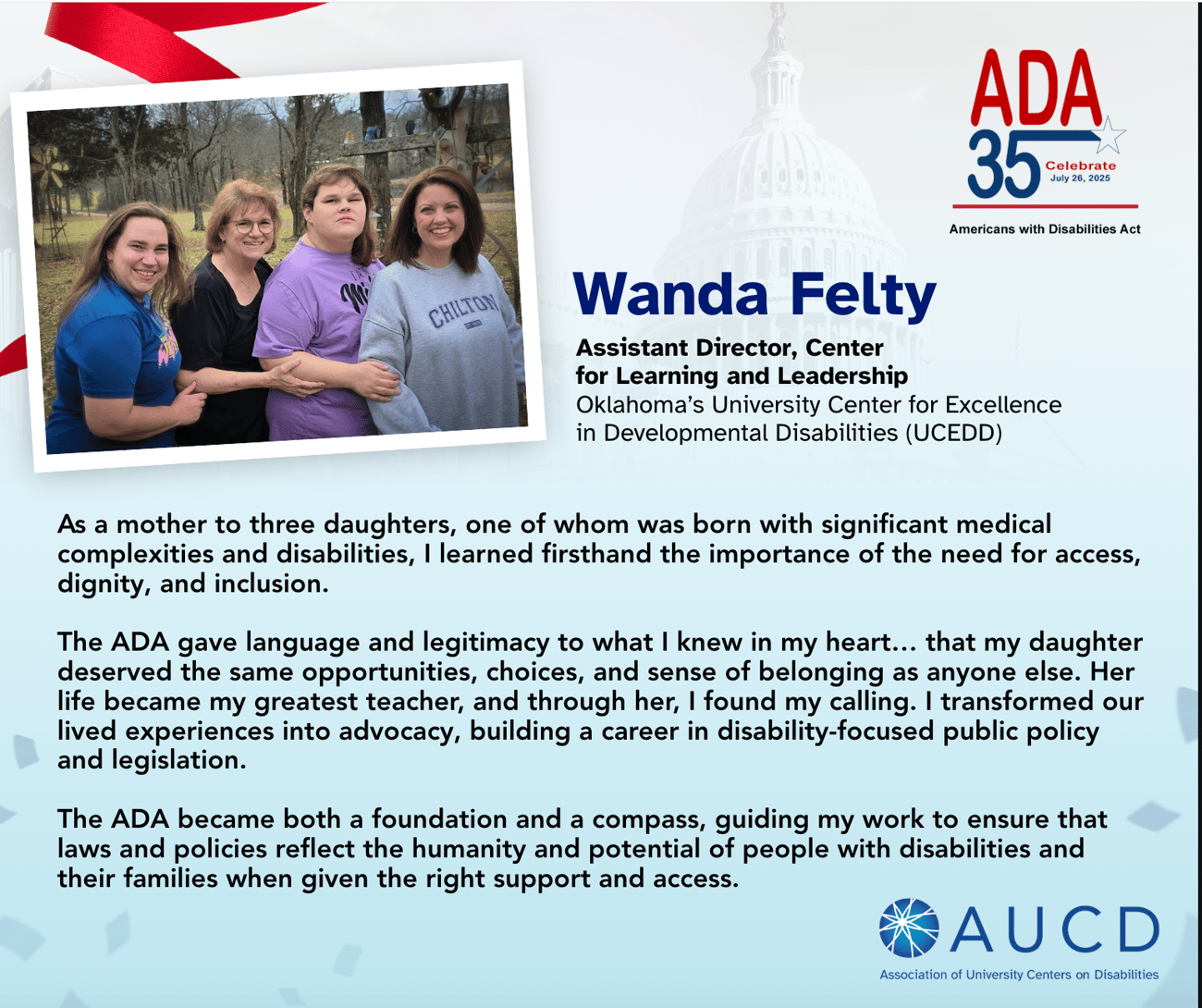|
The ADA at 35: How UCEDDs, LENDs, and IDDRCs Support People with Disabilities |
|
AUCD is proud to honor and celebrate the 35th anniversary of the Americans with Disabilities Act. This landmark civil rights legislation impacts the lives of millions of Americans with disabilities and protects against discrimination. It ensures and improves access to opportunities afforded to all. The ADA is built upon four pillars: full participation, independent living, equality of opportunity, and economic self-sufficiency. Our Centers and Programs are unwavering in their commitment to these ideals - conducting research, training the next generation of leaders, and providing direct services to children and adults with disabilities, shaping their communities into more fully inclusive places through this work.
Significant advances have been made to ensure people with disabilities live and work in the community with appropriate supports and services. The AUCD Network of interdisciplinary centers in every state and territory has been instrumental in these efforts. They have transformed policy, practice, and systems because of the ADA.
We encourage you to learn more about how AUCD Network supports the promise of the ADA here: https://www.aucd.org/annualreport
|
|
|
|
Just in the last year, more than 513,000 people and organizations received technical assistance from AUCD members, more than 965,000 people received continuing education, and more than 177,000 families received clinical services such as diagnostic evaluations for developmental disabilities, therapies, and more. |
|
|
|
As the Americans with Disabilities Act turns 35 years old, the federal government is proposing to eliminate UCEDDs, the very institutions that help lead the charge to fight for meaningful inclusion in the community for people with disabilities. UCEDDs conduct person-centered research, pilot cutting-edge programs, and work hand-in-hand with state governments to make plans that will benefit the unique needs of each state’s disability community. They are the knowledge engine of the Developmental Disabilities network across the country, working to fulfill the promise of the ADA through the resources and expertise of universities. We are asking our community to remind Members of Congress and Governors that the work of the ADA is not finished, and UCEDDs are vital to that work. Please take a few minutes to use our grassroots action tool that enables individuals, families, professionals, and allies to contact their Members of Congress and urge them to reject the Administration’s harmful proposal and fully fund UCEDDs in FY 2026.
Sandy Root-Elledge, Interim Executive Director of AUCD urges UCEDDs to educate and advocate. "As a parent of two adult children with developmental disabilities, prior UCEDD director, and current interim executive director of AUCD, I have witnessed firsthand the transformative impact of UCEDDs on families and communities. The proposal to eliminate these vital institutions jeopardizes the progress we have made towards meaningful inclusion for individuals with disabilities. It is crucial that UCEDDs are preserved and continue to serve as a bridge from universities to communities to ensure fully inclusive societies."
|
|
We encourage you to take these three steps:
- Personalize your message to reflect the impact your UCEDD has had on your life or community
- Share this action widely with your networks, including families, students, staff, alumni, and partners
- Share the tool on social media, tag AUCD, and use the hashtags #SaveUCEDDs and #DisabilityAdvocacy
AUCD joins with the civil rights community in celebrating the progress our society has made in the 35 years since the passage of the ADA. We are committed to continuing the work needed to fulfill its promise of full inclusion for all members of all communities.
|
|
#ThanksToTheADA: Stories of How the Landmark Law Has Supported Individuals and Families |
|
|
|
|
Melanie Davis, an Advocate Mentor from the Munroe-Meyer Institute, University of Nebraska Medical Center, shares how the ADA supports her and how it inspired her to build a career in disability advocacy.
|
 |
|
Wanda Felty, Assistant Director at the Center for Learning and Leadership, Oklahoma’s University Center for Excellence in Developmental Disabilities, shares how the landmark legislation has supported her family and her daughter’s life.
|
 |
|
The Association of University Centers on Disabilities (AUCD) is a national association that supports its member Centers and Programs in their research, training, education, and service so that together, AUCD and Network members can promote the quality of life, health, and well-being of people with disabilities.
Please note - some language in this campaign constitutes lobbying as the messages directly ask to fund the UCEDDs. Please consider this when choosing the email you use to send the messages. |
|
|
|
|
AUCD | 1100 Wayne Avenue, Suite 1000 | Silver Spring, MD 20910 |
|
|
|
|
|
|
|
|
This newsletter is in part supported by the Administration on Community Living (ACL) through a technical assistance contract for the URC and the Centers for Disease Control and Prevention (CDC) for a National Professional Organization for Persons with Developmental Disabilities. The content of this material does not necessarily reflect the views and policies of any federal agency. No official support or endorsement by federal agencies is intended not to be inferred. |
|
|
|
|
|
|